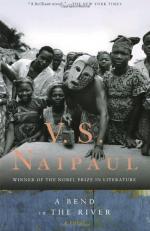|
This section contains 6,823 words (approx. 23 pages at 300 words per page) |

|
SOURCE: Samantrai, Ranu. “Claiming the Burden: Naipaul's Africa.” Research in African Literatures 31, no. 1 (spring 2000): 50-62.
In the following essay, Samantrai examines the function of imperialistic discourse in A Bend in the River and describes the novel as “a fictional documentation of the political shift from colonial to postcolonial Africa.”
In his work on the epistemology of the anthropological endeavor, Johannes Fabian argues that the “West” constructs its relationship with “the Rest” (28) through a notion of time that affirms “difference as distance” (16). Fabian is concerned primarily with the notion of modernity, the trope through which the West locates itself and constructs the difference of its racial and cultural others. Inherent in his “Politics of Time,” however, is a politics of sexuality that, in addition to creating a teleological history for the triumph of the normative Western subject, also posits a specifically gendered location for the Rest. The epistemology Fabian...
|
This section contains 6,823 words (approx. 23 pages at 300 words per page) |

|


